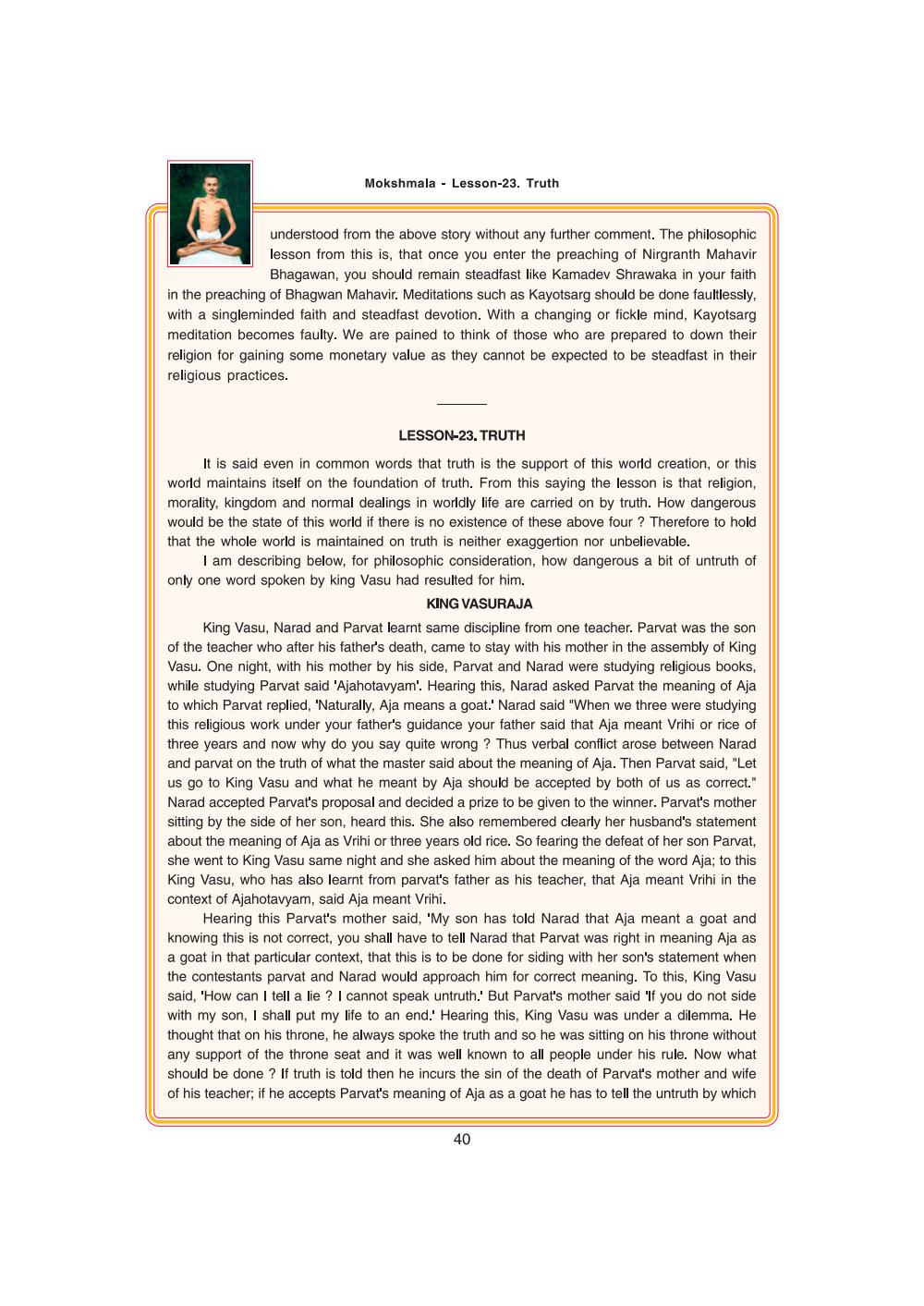________________
Mokshmala - Lesson-23. Truth
understood from the above story without any further comment. The philosophic lesson from this is, that once you enter the preaching of Nirgranth Mahavir
Bhagawan, you should remain steadfast like Kamadev Shrawaka in your faith in the preaching of Bhagwan Mahavir. Meditations such as Kayotsarg should be done faultlessly, with a singleminded faith and steadfast devotion. With a changing or fickle mind, Kayotsarg meditation becomes faulty. We are pained to think of those who are prepared to down their religion for gaining some monetary value as they cannot be expected to be steadfast in their religious practices.
LESSON-23. TRUTH
It is said even in common words that truth is the support of this world creation, or this world maintains itself on the foundation of truth. From this saying the lesson is that religion, morality, kingdom and normal dealings in worldly life are carried on by truth. How dangerous would be the state of this world if there is no existence of these above four ? Therefore to hold that the whole world is maintained on truth is neither exaggertion nor unbelievable.
I am describing below, for philosophic consideration, how dangerous a bit of untruth of only one word spoken by king Vasu had resulted for him.
KING VASURAJA King Vasu, Narad and Parvat learnt same discipline from one teacher. Parvat was the son of the teacher who after his father's death, came to stay with his mother in the assembly of King Vasu. One night, with his mother by his side, Parvat and Narad were studying religious books, while studying Parvat said 'Ajahotavyam'. Hearing this, Narad asked Parvat the meaning of Aja to which Parvat replied, 'Naturally, Aja means a goat.' Narad said "When we three were studying this religious work under your father's guidance your father said that Aja meant Vrihi or rice of three years and now why do you say quite wrong? Thus verbal conflict arose between Narad and parvat on the truth of what the master said about the meaning of Aja. Then Parvat said, "Let us go to King Vasu and what he meant by Aja should be accepted by both of us as correct." Narad accepted Parvat's proposal and decided a prize to be given to the winner. Parvat's mother sitting by the side of her son, heard this. She also remembered clearly her husband's statement about the meaning of Aja as Vrihi or three years old rice. So fearing the defeat of her son Parvat, she went to King Vasu same night and she asked him about the meaning of the word Aja; to this King Vasu, who has also learnt from parvat's father as his teacher, that Aja meant Vrihi in the context of Ajahotavyam, said Aja meant Vrihi.
Hearing this Parvat's mother said, 'My son has told Narad that Aja meant a goat and knowing this is not correct, you shall have to tell Narad that Parvat was right in meaning Aja as a goat in that particular context, that this is to be done for siding with her son's statement when the contestants parvat and Narad would approach him for correct meaning. To this, King Vasu said, 'How can I tell a lie ? I cannot speak untruth.' But Parvat's mother said "If you do not side with my son, I shall put my life to an end.' Hearing this, King Vasu was under a dilemma. He thought that on his throne, he always spoke the truth and so he was sitting on his throne without any support of the throne seat and it was well known to all people under his rule. Now what should be done ? If truth is told then he incurs the sin of the death of Parvat's mother and wife of his teacher; if he accepts Parvat's meaning of Aja as a goat he has to tell the untruth by which
40




